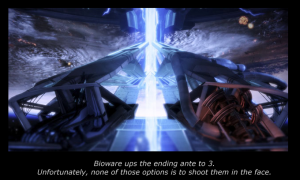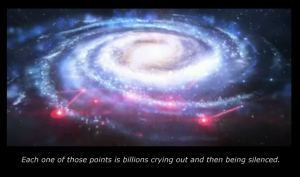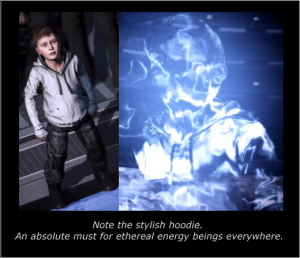So for over a month now I have been mulling over what should be the first article on this site. Because beginnings are important, even if not always memorable in the long run. They create first impressions and set the tone for what is to come. It may seem an odd choice for the first item on a review site to not be what you would normally call a review, but I don’t want this to be a standard review site. So instead this, my site’s beginning, is to be an article on endings.
There has recently been a lot of talk about story, most especially endings, in video games due to the ‘controversial’ [Read: terrible] ending of Mass Effect 3. Now I’ll state right now, upfront, that I have not played Mass Effect 3. In fact, at the time of this writing I have not even played my way through Mass Effect 2. This is because I, unlike what often seems to be the entire rest of the gaming community, did not think Mass Effect [1] was absolutely the best thing ever. But that is a topic for another article. Suffice it to say that I have kept up on the story of the Mass Effect games, and I have seen the ending.
NOTE: AS THIS ARTICLE COVERS ENDINGS, SPOILERS ABOUND BEYOND THIS POINT. YOU HAVE BEEN WARNED.
So, the ending is terrible. I’ve not even talking about some subjective, everyone has their own opinion type of terrible. I mean terrible no matter what your personal opinion or liking is. It boils down to a cheap three-way-split ending (“good”, “bad”, and “in between”) which themselves provide very little differentiation in the final cutscene. There’s also a rather massive plothole regarding the Normandy (the main character’s ship) suddenly being in a place it should not be. Oh, and at the last minute you get a new ‘bad guy’ who it turns out is in charge of the Reapers (main bad guys since the first game). All of these are pretty big no-nos in storytelling, though the first one only applies to video games that flaunt their choice system.
Let’s cover the mysterious new ‘bad guy’ first. Now, I say bad guy like that, because it seems to be presented that this character isn’t actually good or evil, rather simply a force that was using the Reapers for their own purposes. So, it’s a bad guy in the sense that it has a rather antagonistic relationship to our hero. I suppose the best way to describe the character to those who have not played Mass Effect or seen the ending is to draw comparison to The Matrix. In The Matrix Reloaded our protagonist, Neo, meets a program called ‘the Architect’. This man explains to Neo that The Matrix is not a continuously running simulation, but rather one that must be periodically restarted- hence the program cycles through the same generation(s) of human existence over an unknown period of time. He also reveals that Neo himself is a vital part of that “rebooting” process, at which point he gives Neo a choice, to continue the cycle as it has always been, or to break the cycle (which will purportedly mean the end of humanity).
This is virtually the same scenario that plays out in the end of Mass Effect 3. Shepard has, by this point, learned that the Reapers ‘cull’ the developed races of the galaxy at set intervals. He also learns that the Reapers themselves are formed from the culled races–each Reaper is created using a single race–so as to preserve those races. In then end, it is revealed that long ago some intelligence set up this rhythm to prevent sentient races from creating synthetic beings. This is due to their belief that organics will always strive to create synthetics, and that synthetics will then destroy all organic life. At this point Shepard is given a choice, to either take control of the Reapers and command them to leave (though this seems to only delay the inevitable), destroy all synthetic life in the galaxy (killing the Reapers and the Geth), or ‘synthesize’ the synthetics and organics into one race (I think, this ending seems really vague to me). It’s especially hard to differentiate what happens in the Control and Synthesize endings, as the cutscenes are something like 95% identical. Note that there is no option to tell this enigmatic new character exactly where it can shove it’s choices.
This is all rather contrary to what you [can] learn in the the series. That is, that the Geth (a robotic race who gained sentience, rose up, and exiled their creators) don’t really care about the organics. Those you fight in the first game are actually viewed as ‘heretics’ by the Geth as a whole. So they have no desire to fight or destroy organic life, if anything it is actually the organics who provoke and attempt to destroy the Geth. Furthermore, in Mass Effect 3, you can broker a peace between the Geth and their creators (the Quarian), which should prove that organics and synthetics can live in at least relative peace, if not harmony. So at the very least, if you do broker this peace, there should have been an option at the end to tell the Catalyst (aforementioned ‘bad guy’) that it’s basis for Reapers is wrong.
It’s also worth pointing out that the choice itself doesn’t matter much, as all the endings result in the virtual, if not total, annihilation of organic life. This is because all the endings (which again, are not presented as very different) result in the destruction of the Mass Relays–this universe’s primary means of Faster-Than-Light travel–at a point when a vast amount of the life in the universe is engaged in a space battle, leaving all of those aboard the ships stranded in space with limited resources. Even that is ignoring the prior-established fact that a Mass Relay exploding would take out the entire system it was in. So, yeah, no matter which ending you pick, everyone’s dead.
Well, almost everyone. Plothole time, folks. See, the Normandy was in that aforementioned space battle. Then it isn’t. The ending shows you the ship for some reason using FTL, which it gets knocked out of and crashes on an (of course habitable) alien world. There is no reason that ship would have or should have left that space battle. And there certainly isn’t one given.
So the ending? It’s bad. But that’s not exactly my point, we’re not quite there yet. After all, anyone who knows about the ending should know it’s terrible. This was just the primer for those who didn’t. All of this talk about this terrible ending has brought up the point of creative rights versus consumer wants– should this ending be changed simply because people don’t like it? Should such a question even be asked?
Well, that’s complicated. A lot of people hate the constant ‘updates’ to the classic Star Wars trilogy, and wish someone would stop George Lucas from fiddling with it, but most people accept that, for better or worse, it is his series, his story, and his property. On the other hand we are talking about a product, for which the consumer is charged and expects a certain degree of entertainment value from.
Spurring from the mass amounts of people demanding BioWare change the ending of Mass Effect 3, a large number of people have popped up decrying the former group as a bunch of ‘entitlement’ whiners. The claim is that these people have no right to demand a change in story, as the story belongs to Bioware, the consumers merely paying for opportunity to play it and are thus not entitled to change it. I don’t agree with that.
Not exactly, anyway. I do think there’s a certain point where an attitude of such entitlement gets silly. If you buy some fast-food burger, for example, you are not entitled to a fine steak and lobster dinner, but you are entitled to not get Mad Cow disease or eyeballs in your burger. I get what the naysayers are, well, saying. I just don’t think it’s really the case here.
Most people aren’t demanding a specific, or even happy, ending. They just want something better, something of the quality they have come to expect from BioWare. I don’t think there’s anything wrong with that. In fact, I hardily agree with it and I believe that BioWare should be expected to make any re-writing of the ending completely free to everyone who buys the game. It was their mistake, their fault, their failure, and there’s no way the fans should have to pay for it.
Going beyond just Mass Effect, and even beyond video games, I do think there needs to be a ‘standard’ for such things. Not really a rule, but more an understanding. The big problem that tends to come from movies and video games (as opposed to, say, food or clothing) is that they tend to have a hard-set price point. In the current-gen market newly released console games are always $60 (Wii games are $50 and PC games are still transitioning over to $60) and all movie tickets cost ~$12. Maybe that shouldn’t be acceptable, maybe we need price to reflect quality.
In the end BioWare should be expected to ‘make up the difference’ between the writing throughout the rest of the series, and it’s ending. And indeed, George Lucas should not be allowed to constantly meddle with what was a finished product nearly three decades ago.
But AH! It’s twist time. Bet you didn’t see that coming, what with twist basically being a standard by this point. A number of gamers/fans/internet-people have theorized that the terrible ending of Mass Effect 3 is on purpose. That it was done specifically to sell DLC and/or a sequel. Most people think it’s just DLC, but I think given the amount of money the series has made we’re going to see a Mass Effect 4. Now, I have to begrudgingly admit that a false-ending like that is nothing short of genius in terms of storytelling (basically adding a twist to the cliche twist), but only if you don’t charge for the true ending.
One rather thought-provoking take on the ending is that it’s the Reapers attempting to Indoctrinate Shepard. For those who don’t know, Indoctrination is when exposure to the Reapers (and/or their tech) causes you to begin to see things “their way”. We don’t really know how the process works from the victim’s point of view, so this idea is viable. This would certainly explain a few things, such as the lack of the ability to question, refute, or outright shoot the Catalyst (the aforementioned last minute antagonist who takes the form of an ethereal child). It also explains why the Catalyst’s model is the same as a child Shepard watches die in the beginning of the game. Though, both of those could simply be attributed to the ending being as rushed and/or terrible as it seems to be.
If this is the case– if the ending is this way intentionally, it shouldn’t have been the ending. A false ending, sure, that would be awesome. However the game should have kept going, at least if you make the ‘correct’ choice at the false-ending. I could see it being fair for the remainder of the game/ending to simply be locked off, and revealed some time after the game’s release. Though plenty of games in the past have put their ‘true ending’ behind a Game+ (augmented second play-through) or Final Chapter (gameplay segment only unlocked after beating the game), so I’m not sure why they wouldn’t have just done that. Either way, whether they’re fixing the ending, or just revealing it, that shouldn’t cost people anything. Don’t sell the ‘true ending’ to people as DLC, and if this was just a publicity stunt for the unveiling of Mass Effect 4, that’s underhanded, BioWare. Magnificent, but underhanded.











Comments (0)